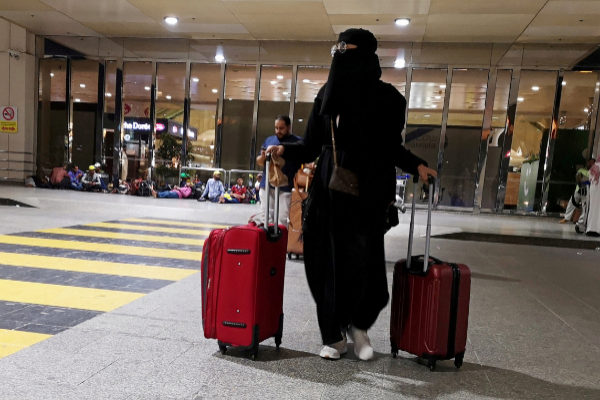One of the historical demands of Saudi women, to be able to travel abroad without obtaining the placet of their male guardian, has been fulfilled this week. The authorities have begun to implement the legislative reform announced earlier this month that involves a scissor to the male guardianship system, which, however, continues to subdue the female population of the kingdom.
According to the Saudi state news agency Spa, the passport and civil status departments of all provinces in the country have received this week the order to apply the amendment to the travel document standard. A modification that allows Saudis over 21 years of age to apply for a passport and travel abroad without the mandatory authorization of the "mahram" (male guardian), whether parent, spouse or brother.
"Any movement that relaxes the oppressive male guardianship system of Saudi Arabia, which severely restricts women's freedoms, is a welcome step," acknowledges THE WORLD Josh Cooper, deputy director of ALQST, a London-based group that denounces human rights violations committed in the ultraconservative realm.
The measure has also been received with relief by the Saudis. According to local press, more than a thousand women left last Monday the eastern province of the country without the authorization of the tutor . The government decree also allows women to register births, deaths, marriages or divorces, a right reserved so far to the male population.
For the first time, women can be appointed guardians of minors. The order also modifies the labor legislation by declaring that "work is a citizen's right" and stress that employers cannot discriminate against their workforce because of their sex, age or disabilities in the framework of the prince's attempts heir Mohamed bin Salman to increase the female employment rate, currently at 22 percent.
A breakthrough with limitations
Progress, however, is scarce for dissent and feminist movements that have been fighting for an even distant equality for years. "The travel restrictions have disappeared but others remain in force. Women still need the tutor's approval to study or access health care. The whole system must be abolished," says Cooper. Nor can Saudis be admitted to centers for victims of abuse; undergo operations or abortions before the mother's vital risk; get marry; or get out of prison without the guardian's placet.
A claim that also denounces Human Rights Watch, concerned about the fine print of the new regulation. "The authorities should ensure that male tutors cannot use court resolutions to circumvent this progress and should also update the Absher digital platform so that women are able to apply for a passport with the same ease as men", demands Rothna Begum, researcher on women's rights of the international organization.
"Absher" is a mobile application created by the national information center of Saudi Arabia with which male tutors could so far handle the freedom of their care. In just a few clicks, for example, they could authorize their trips specifying the dates, the total period and the airport used. "In addition, in Saudi Arabia there is no anti-discrimination law and the Government has no duty to actively pursue discrimination against women," they denounce from Human Rights Watch.
In recent years, the monarchy has eliminated some of the limitations that women still suffered, such as a driving ban or a ban on their access to the armed forces. The restrictions marked by sex segregation have also been mitigated. Advances that, however, have been seriously compromised by the campaign of repression against women who precisely led the claims.
In May 2018, security forces arrested a dozen activists, protagonists of a judicial process that has led to the international condemnation. Although some of them were released on bail, last April a new wave of arrests reached a dozen women rights defenders.
The detainees claim to have suffered abuse and torture behind bars. In the middle of this month, relatives of Loujain al-Hathloul, one of the young women who are still in prison, said that the authorities had offered her release in exchange for publicly denying previous allegations that she had been tortured and assaulted.
The arrested women, turned into an icon of the long struggle for the equality of the Saudis, are accused of " having maintained suspicious contacts with rival countries " and "undermining national security and stability." Accusations that could lead to sentences of up to twenty years in prison and that cast huge doubts about the kingdom's commitment to improve the situation of its female population. "The farce should not continue: the authorities cannot reform on the one hand and on the other hand imprison women who fought for their rights," Begum claims.
According to the criteria of The Trust Project
Know more- Saudi Arabia
- THE WORLD
- London
Saudi Arabia allows women to travel and work without a man's permission
Crimes that changed Spain (III) Mari Àngels Feliu, the impossible investigation of the pharmaceutical company of Olot
The strange response of Marta López in Miss World Spain 2019

